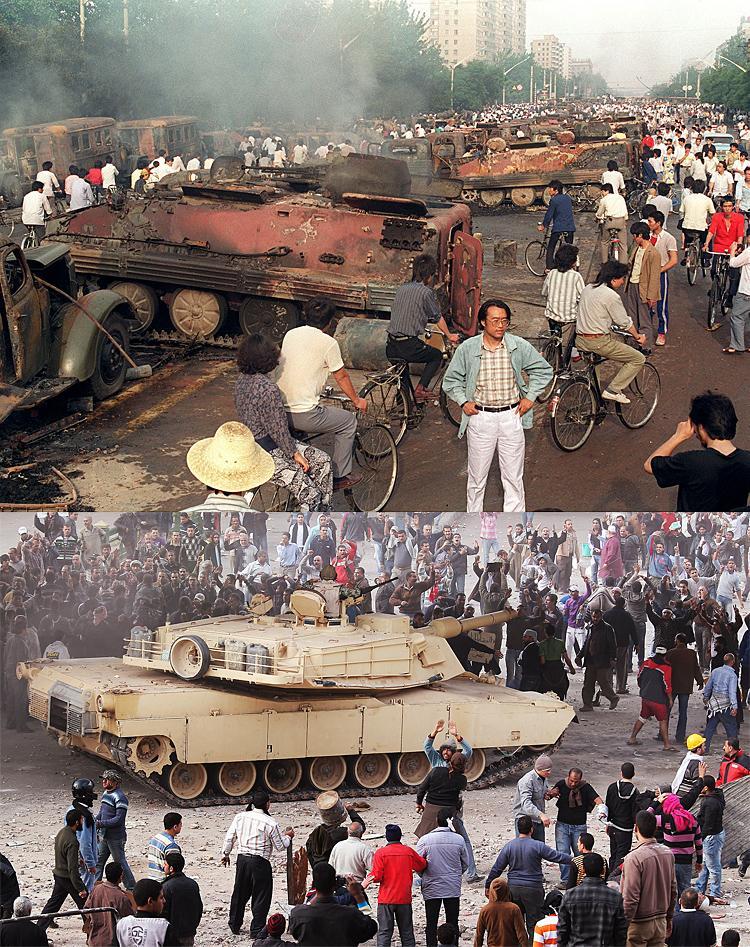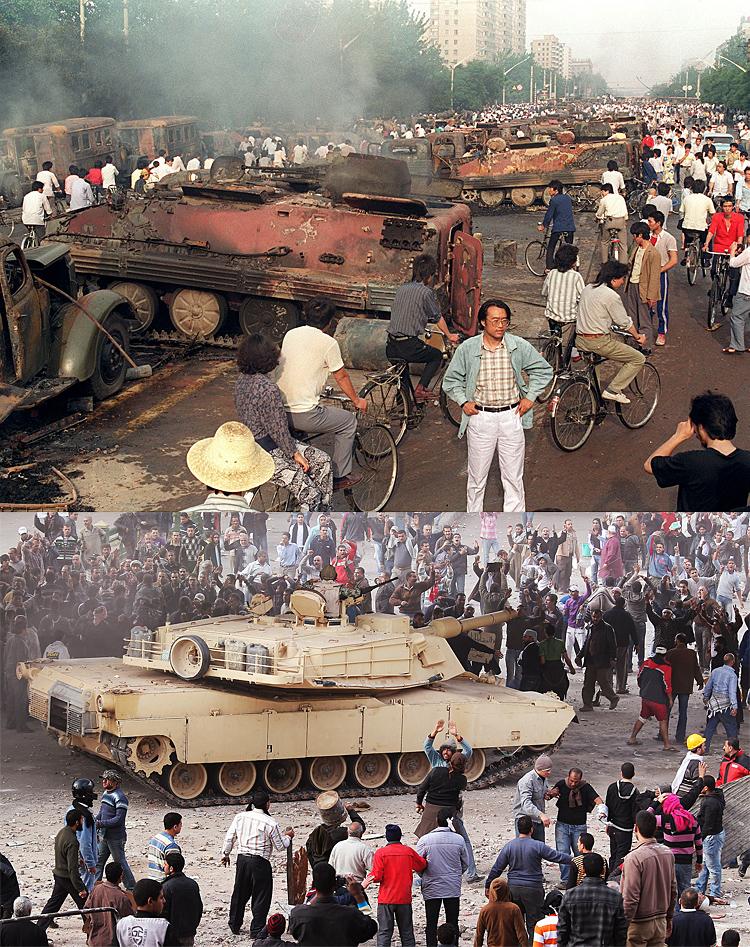Chinese people are soul-searching. The Egyptian military’s restraint during the weeks of Egyptian people’s uprising against government dictatorship, has awakened memories of the bloody 1989 military crackdown in Tiananmen Square. The story of one PLA commander who defied orders to open fire on the students is especially noteworthy.
Xu Qinxian, a former PLA commander of China’s 38th army, who was demoted and jailed for refusing to carry out orders to crack down on the students in Tiananmen Square on June 4, 1989, recently told an overseas friend he has no regrets.
When Beijing began imposing martial law and preparing for the crackdown, the 38th army under Xu’s command was the first task force in Beijing receiving the orders. When Xu refused to shoot at the students, he was dismissed from his post, arrested, and sent to prison. After five years in prison Xu was released and banished from Beijing. He has since been living in Shijiazhuang, Hebei Province, according to a 2009 report by Asia Weekly .
The 38th Army still went ahead and massacred the students, under the lead of political commissioner Wang Fuyi. Afterwards eight soldiers were awarded the title “Guardian of the Republic,” Apply Daily said in a Feb. 15 report.
On Feb. 14 Xu was visiting his friend and former secretary to Mao Zedong, Li Rui, when an overseas friend called and the three of them talked about the past.
When asked if he regretted defying the order to crack down on the students 22 years ago, Xu replied, “It’s something that happened in the past, so there’s no need for regret. What I did or didn’t do, there is nothing to regret.”
Xu told a friend afterwards, “I would rather be dead than be condemned by history.”
Xu was not the only member of the PLA army that defied orders to fire on the students.
Zhang Shijun, a veteran from Shandong who participated in the June 4 crackdown, praised the Egyptian soldiers for setting an example.
“Chinese soldiers should feel ashamed before the Egyptian army. The army should not fire at its own people,” Zhang told Apple Daily.
One netizen wrote: “China lost an important opportunity for democracy in 1989; the army was reduced to a soulless machine.”
Hong Kong senior journalist Ching Cheong believes that the key to the Egyptian people’s victory is that the Egyptian army did not open fire on their people.
“Nationalization of the military is not just a slogan; it is about human life. China’s military is owned by the Party, not the state,” Ching told The Epoch Times .
The PLA Daily recently reported that the CCP has issued a directive to strengthen Party organizations in the army.
“That is to ensure the Party’s absolute leadership over the army. Reiterating it at a time like this proves that the CCP is extremely afraid of incidents like the Egyptian revolution,” Ching said.
Li Tianxiao , a political commentator with New Tang Dynasty TV, believes that nowadays the possibility is high that the Chinese army would, under those circumstances, stage a military coup or local uprising to oust the CCP during a critical moment.
Li said his assumption is based on several changes in the military during recent years: “Since 2006 many people in the army have quit the CCP. There are power struggles between military factions. Many officers can surf the Internet and find different perspectives. Many soldiers, identifying themselves as local forces, have sent e-mails and submitted articles to overseas websites, saying they are seeking to organize more military forces to overthrow the CCP and hope others would cooperate.”
Xu Qinxian, a former PLA commander of China’s 38th army, who was demoted and jailed for refusing to carry out orders to crack down on the students in Tiananmen Square on June 4, 1989, recently told an overseas friend he has no regrets.
When Beijing began imposing martial law and preparing for the crackdown, the 38th army under Xu’s command was the first task force in Beijing receiving the orders. When Xu refused to shoot at the students, he was dismissed from his post, arrested, and sent to prison. After five years in prison Xu was released and banished from Beijing. He has since been living in Shijiazhuang, Hebei Province, according to a 2009 report by Asia Weekly .
The 38th Army still went ahead and massacred the students, under the lead of political commissioner Wang Fuyi. Afterwards eight soldiers were awarded the title “Guardian of the Republic,” Apply Daily said in a Feb. 15 report.
On Feb. 14 Xu was visiting his friend and former secretary to Mao Zedong, Li Rui, when an overseas friend called and the three of them talked about the past.
When asked if he regretted defying the order to crack down on the students 22 years ago, Xu replied, “It’s something that happened in the past, so there’s no need for regret. What I did or didn’t do, there is nothing to regret.”
Xu told a friend afterwards, “I would rather be dead than be condemned by history.”
Xu was not the only member of the PLA army that defied orders to fire on the students.
The Impact of Egyptian Uprising on China
According to a March 2009 article in Open Magazine, general Liu Yazhou said in a public speech that the 28th army, stationed in Beijing, was also sympathetic to the students. He said the 28th army moved into Tiananmen Square in the morning of June 4, but was intercepted by people.
And while the vice chairman of the Central Military Commission, Liu Huaqing, sent a helicopter ordering the troops to “move forward, no matter what,” commander He Yanran of the 28th army did not listen.
Egypt and China
Many media reports and commentators have compared the 2011 Egyptian uprising with China’s 1989 student movement. The difference in the two outcomes, clearly, has been the military’s response. Egyptian army restraint serves as an inspiration to Chinese people and a point for reassessment of the June 4, 1989 events.Zhang Shijun, a veteran from Shandong who participated in the June 4 crackdown, praised the Egyptian soldiers for setting an example.
“Chinese soldiers should feel ashamed before the Egyptian army. The army should not fire at its own people,” Zhang told Apple Daily.
One netizen wrote: “China lost an important opportunity for democracy in 1989; the army was reduced to a soulless machine.”
Hong Kong senior journalist Ching Cheong believes that the key to the Egyptian people’s victory is that the Egyptian army did not open fire on their people.
“Nationalization of the military is not just a slogan; it is about human life. China’s military is owned by the Party, not the state,” Ching told The Epoch Times .
The PLA Daily recently reported that the CCP has issued a directive to strengthen Party organizations in the army.
“That is to ensure the Party’s absolute leadership over the army. Reiterating it at a time like this proves that the CCP is extremely afraid of incidents like the Egyptian revolution,” Ching said.
Li Tianxiao , a political commentator with New Tang Dynasty TV, believes that nowadays the possibility is high that the Chinese army would, under those circumstances, stage a military coup or local uprising to oust the CCP during a critical moment.
Li said his assumption is based on several changes in the military during recent years: “Since 2006 many people in the army have quit the CCP. There are power struggles between military factions. Many officers can surf the Internet and find different perspectives. Many soldiers, identifying themselves as local forces, have sent e-mails and submitted articles to overseas websites, saying they are seeking to organize more military forces to overthrow the CCP and hope others would cooperate.”





